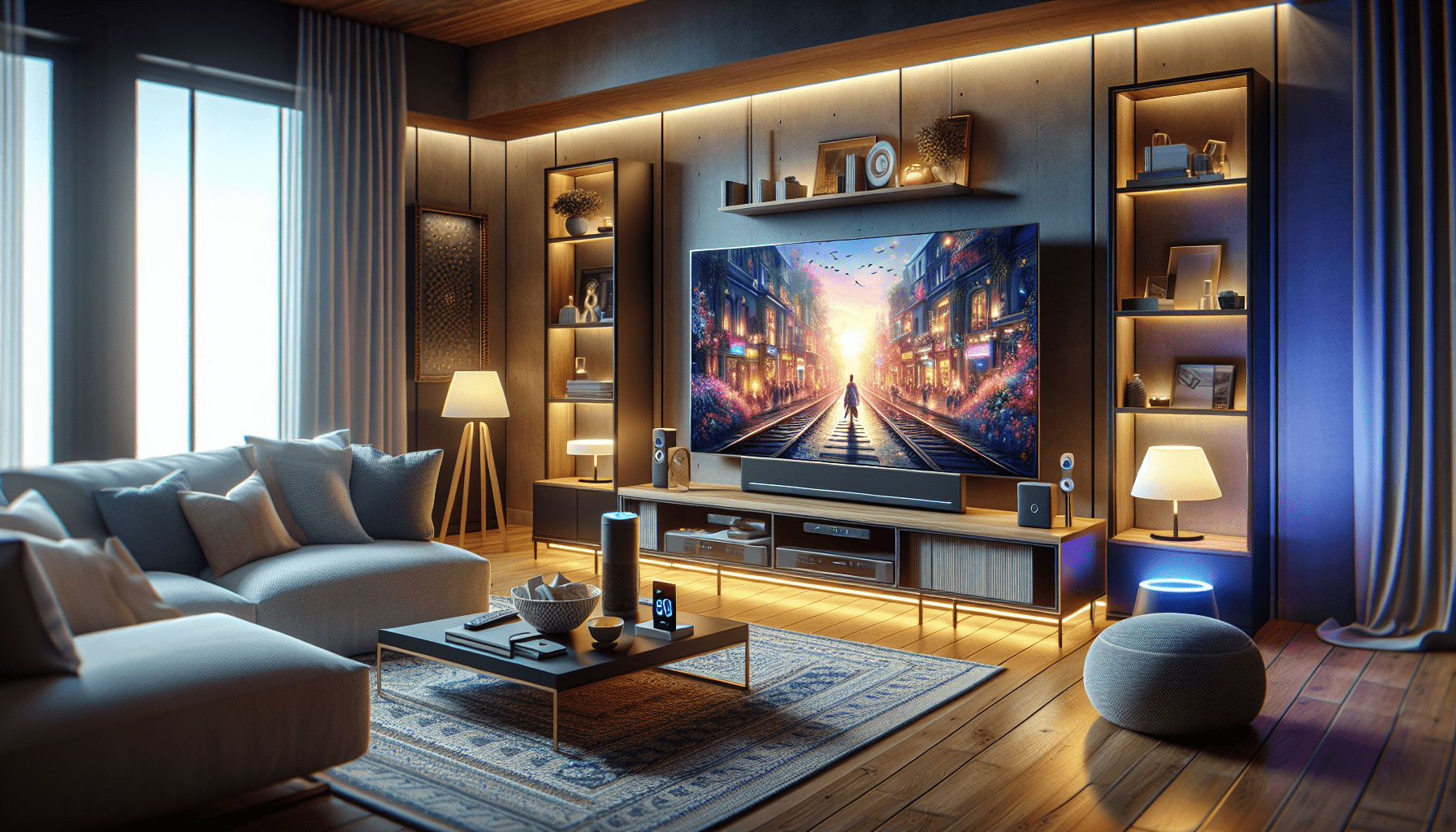Imagine coming home after a long day at work, ready to unwind and relax. As you enter your house, the lights automatically adjust to create a soothing ambiance, and your favorite music starts playing softly in the background. You settle into your cozy sofa and effortlessly control the volume and playlist with just a voice command. This is the wonder of smart home entertainment – a new era where technology seamlessly integrates with your home to enhance your relaxation and entertainment experiences. In this article, we will explore what smart home entertainment is all about and how it can transform your living space into a personalized entertainment haven. Get ready to embark on a journey where convenience and entertainment go hand in hand. Smart home entertainment refers to the integration of technology in our homes to enhance our entertainment experiences. It involves the use of various devices and systems that are connected and can be controlled from a centralized hub or through voice commands. Smart home entertainment allows you to enjoy a wide range of content, from movies and TV shows to music and gaming, all with the convenience and accessibility of smart technology. In this article, we will explore the definition, evolution, components, advantages, features, content, security, challenges, future trends, and costs of smart home entertainment.
Understanding Smart Home Entertainment
Definition of Smart Home Entertainment
Smart home entertainment can be defined as the use of connected devices and systems to enhance the entertainment experience in your home. These devices include smart TVs, streaming devices, smart speakers, and gaming consoles, among others. With smart home entertainment, you can access a wide range of content, control your devices with voice commands, and create a personalized and immersive experience.
Evolution of Smart Home Entertainment
Smart home entertainment has evolved significantly over the years. It started with the introduction of smart TVs, which allowed users to access internet-based content directly on their televisions. As technology advanced, streaming devices such as Apple TV and Roku became popular, providing users with more options for content streaming. Smart speakers, like Amazon Echo and Google Home, added voice control capabilities to the entertainment experience. Today, gaming consoles have also joined the smart home entertainment ecosystem, allowing gamers to enjoy immersive gaming experiences from the comfort of their homes.
Components of Smart Home Entertainment
Smart home entertainment comprises several components that work together to create a seamless and connected entertainment experience. These components include smart TVs, streaming devices, smart speakers, and gaming consoles. Each of these devices has its own unique features and capabilities, but when combined, they provide a comprehensive smart home entertainment setup.
Smart Home Entertainment Devices
Smart TVs
One of the key components of smart home entertainment is the smart TV. These televisions are equipped with built-in internet connectivity and software platforms that allow users to access a variety of streaming services, online videos, and other content directly on their TV screens. Smart TVs often come with app stores where you can download and install new apps to expand your entertainment options.
Streaming Devices
Streaming devices, such as Apple TV, Roku, and Amazon Fire TV, are another essential part of smart home entertainment. These devices connect to your TV and provide access to a wide range of streaming services, including popular platforms like Netflix, Hulu, and Disney+. They also offer additional features like voice control and screen mirroring, allowing you to easily navigate and enjoy your favorite content.
Smart Speakers
Smart speakers, like Amazon Echo and Google Home, are a newer addition to the smart home entertainment landscape. These speakers not only provide high-quality audio but also come equipped with voice assistants that allow you to control your entertainment devices with simple voice commands. You can play music, control your TV, and even ask for information or assistance, all without lifting a finger.
Gaming Consoles
Gaming consoles, such as PlayStation, Xbox, and Nintendo Switch, have long been a popular choice for gaming enthusiasts. However, with the advent of smart home entertainment, gaming consoles have become even more versatile. They now offer access to a wide range of games, streaming services, and online multiplayer experiences. Gaming consoles can be seamlessly integrated into your smart home setup, allowing you to enjoy immersive gaming experiences on your big screen TV.
Advantages of Smart Home Entertainment
Convenience and Accessibility
One of the main advantages of smart home entertainment is the convenience and accessibility it offers. With smart devices, you can easily access a wide range of content without the need for multiple devices or cables. Whether you want to watch a movie, listen to music, or play a game, everything is just a few clicks or voice commands away. Moreover, you can control your devices from a single hub or even through your smartphone, making it incredibly easy to navigate and enjoy your entertainment.
Integration and Control
Another advantage of smart home entertainment is the integration and control it provides. With smart devices, you can create a connected ecosystem where all your devices work seamlessly together. For example, you can use your smart speaker to control your TV, adjust the volume, or launch your favorite streaming app. You can also create custom routines or scenes that automate certain actions. For instance, you can set up a “movie night” scene that dims the lights, turns on the TV, and starts playing your favorite movie with just a voice command or a single tap.
Enhanced Audio and Visual Experience
Smart home entertainment devices are designed to provide an enhanced audio and visual experience. Smart TVs offer high-resolution displays and support for technologies like HDR and Dolby Vision, which result in vibrant colors and impressive picture quality. Streaming devices and gaming consoles often support 4K streaming and gaming, allowing you to enjoy content in stunning detail. Smart speakers provide immersive sound quality and can even be connected to multiple speakers for multi-room audio, creating a surround sound-like experience. Overall, smart home entertainment devices aim to deliver a more immersive and enjoyable entertainment experience.
Smart Home Entertainment Features
Voice Control
Voice control is a key feature of smart home entertainment. With voice assistants like Amazon’s Alexa or Google Assistant, you can control your devices using simple voice commands. You can ask for specific movies or TV shows, adjust the volume, skip to the next song, or even play games, all without needing to grab a remote or navigate through menus. Voice control adds convenience and simplicity to your entertainment experience, allowing you to interact with your devices naturally.
Screen Mirroring
Screen mirroring is a feature that allows you to mirror the screen of your smartphone, tablet, or computer onto your TV. This enables you to share photos, videos, or presentations on the big screen, making it perfect for sharing memories with friends and family or for work-related purposes. Screen mirroring is widely supported by smart TVs and streaming devices, and it provides a seamless way to access and enjoy content from your smaller devices on a larger screen.
App Integration
App integration is a crucial aspect of smart home entertainment. With app integration, you can access a wide range of streaming services, online video platforms, and even music streaming apps. This means that you can personalize your entertainment experience by choosing the apps and services that suit your preferences. Whether you prefer Netflix, Hulu, Spotify, or YouTube, smart home entertainment devices offer the flexibility to install and use your favorite apps, giving you endless entertainment options.
Multi-Room Audio
Multi-room audio is a feature that allows you to synchronize and control audio playback across multiple speakers in different rooms of your house. With this feature, you can create a seamless audio experience where the sound seamlessly follows you from one room to another. Whether you’re hosting a party or simply want to enjoy music throughout your home, multi-room audio adds depth and richness to your entertainment experience.
Smart Home Entertainment Content
Streaming Services
Streaming services have revolutionized the way we consume entertainment content. Platforms like Netflix, Hulu, Disney+, and Amazon Prime Video offer a vast library of movies, TV shows, and original content that can be accessed and streamed directly on your smart home entertainment devices. With streaming services, you have the freedom to choose what you want to watch and when you want to watch it, without the need for traditional cable or satellite subscriptions.
Online Video Platforms
Online video platforms, such as YouTube and Vimeo, provide a wide variety of user-generated content, including vlogs, tutorials, music videos, and more. These platforms offer an unlimited source of entertainment and are easily accessible on smart home entertainment devices. Whether you’re looking for educational content, entertainment, or just something to pass the time, online video platforms have something for everyone.
Music Streaming
Music streaming services, like Spotify, Apple Music, and Pandora, offer millions of songs at your fingertips. With smart speakers and streaming devices, you can easily access and control your favorite music streaming apps, creating a personalized and immersive audio experience. You can create playlists, explore new genres, and even control the music in different rooms of your house with just a few commands.
Gaming Options
Gaming has become an integral part of smart home entertainment. Gaming consoles, such as PlayStation, Xbox, and Nintendo Switch, offer a wide range of games that cater to different interests and skill levels. Whether you enjoy action-packed adventures, immersive role-playing games, or casual puzzle games, there is a gaming option for everyone. With the ability to connect online and play with friends, gaming has become a social and interactive experience that can be enjoyed from the comfort of your own home.
Smart Home Entertainment Security
Protecting Personal Data
With smart home entertainment, it is important to prioritize the security of your personal data. Smart devices, such as smart TVs and streaming devices, often collect and store data about your viewing habits and preferences. To protect your personal information, it is essential to set up strong passwords, regularly update your devices’ software, and be cautious about the permissions you grant to apps and services. Additionally, consider using encryption and secure networks to ensure that your data remains private.
Securing Connected Devices
Smart home entertainment devices are connected to the internet, which means they can potentially be vulnerable to cyber threats. To ensure the security of your devices, it is important to keep them updated with the latest firmware and security patches. Use reputable brands and manufacturers, and consider investing in devices with built-in security features. Additionally, it is recommended to set up a separate guest network for your smart devices to reduce the risk of unauthorized access.
Ensuring Network Safety
The security of your smart home entertainment setup also depends on the safety of your home network. Ensure that your Wi-Fi network is protected with a strong password and encryption. Regularly check for unauthorized devices connected to your network and limit the number of devices you connect to your network to reduce the risk of potential vulnerabilities. It is also advisable to regularly monitor network activity and invest in a robust firewall to enhance network security.
Challenges of Smart Home Entertainment
Compatibility Issues
One of the challenges of smart home entertainment is compatibility issues between devices. Not all devices are compatible with each other, which can lead to frustration and limited functionality. Before purchasing smart home entertainment devices, it is important to ensure compatibility with other devices in your setup. Look for devices with compatibility certifications or opt for devices from the same manufacturer to minimize compatibility issues.
Connectivity Problems
Connectivity problems can pose a challenge in smart home entertainment setups. With multiple devices connected to the same network, bandwidth and connectivity issues may arise, resulting in buffering, lag, or loss of connection. To mitigate these problems, ensure that your internet connection is fast and stable, and consider investing in a mesh Wi-Fi system for better coverage throughout your home. Regularly check for software updates and optimize your network settings to enhance connectivity and minimize disruptions.
Privacy and Surveillance Concerns
Smart home entertainment devices often come with features like voice control and built-in cameras, which may raise privacy and surveillance concerns. There have been instances of unauthorized access to voice recordings or security breaches that allow access to camera feeds. To address these concerns, it is important to review the privacy settings of your devices and understand what data is being collected and how it is being used. You can also consider disabling certain features or using physical camera covers for added privacy.
Future Trends in Smart Home Entertainment
Virtual and Augmented Reality
Virtual and augmented reality are expected to play a significant role in the future of smart home entertainment. These technologies offer immersive experiences that go beyond traditional 2D screens. With virtual reality, you can step into a whole new world and engage in interactive experiences, such as gaming, virtual tours, or even virtual social gatherings. Augmented reality, on the other hand, overlays digital content onto the real world, allowing for interactive and enhanced entertainment experiences.
AI and Personalization
Artificial intelligence (AI) is poised to revolutionize smart home entertainment by providing personalized and tailored experiences. AI algorithms can learn your preferences, recommend content based on your interests, and even automate certain actions based on your habits. With AI, your smart home entertainment setup can become smarter over time, adapting to your needs and delivering content that is specifically tailored to you.
Smart Home Integration
Smart home integration is expected to become more seamless and comprehensive in the future. As more devices become smart and interconnected, you can expect a higher level of integration and synchronization. This means that you can control your smart home entertainment devices through a single interface or hub, with all devices working together harmoniously to create a holistic entertainment experience.
Gesture and Motion Control
Gesture and motion control are emerging technologies that allow you to interact with your smart home entertainment devices through gestures or body movements. Imagine controlling your TV by simply waving your hand or pausing a video playback by making a hand gesture. Gesture and motion control add a new level of interactivity and fun to your entertainment experience.
Costs and Considerations
Initial Investment
The initial investment required for smart home entertainment can vary depending on the devices and features you choose. Smart TVs and gaming consoles tend to have a higher upfront cost compared to streaming devices and smart speakers. Furthermore, if you decide to invest in multiple devices or opt for high-end models, the cost can increase significantly. It is important to set a budget and prioritize the features and devices that align with your entertainment needs and preferences.
Subscription Costs
In addition to the cost of the devices, it is important to consider subscription costs associated with streaming services, music streaming, and gaming. While some services offer free content, many popular streaming platforms and music streaming apps require a monthly or yearly subscription. Gaming consoles also often require a subscription for online multiplayer and access to exclusive content. It is essential to factor in these ongoing costs when budgeting for your smart home entertainment setup.
Maintenance and Upgrades
Like any other electronic device, smart home entertainment devices require maintenance and occasional upgrades. It is important to keep your devices updated with the latest firmware and security patches to ensure optimal performance and security. Additionally, consider the lifespan of your devices and plan for potential upgrades in the future. Keeping your devices well-maintained and up-to-date will contribute to a smooth and enjoyable entertainment experience.
User Privacy
User privacy is a crucial consideration when it comes to smart home entertainment. As mentioned earlier, smart devices often collect and store personal data, which may raise privacy concerns. Before purchasing and setting up your devices, review the privacy policies and data handling practices of the manufacturers. Opt for devices from reputable brands known for prioritizing user privacy. Additionally, make use of privacy settings and take necessary precautions to protect your personal information.
Conclusion
Smart home entertainment offers a wide range of benefits and possibilities. With devices like smart TVs, streaming devices, smart speakers, and gaming consoles, you can create a personalized and immersive entertainment experience in your own home. The convenience, integration, and control provided by smart home entertainment devices make it easier than ever to access and enjoy a variety of content. However, it is important to consider the challenges, security concerns, and costs associated with smart home entertainment. By embracing the future trends and considering the needs and preferences of each individual, smart home entertainment has the potential to transform the way we experience entertainment in our homes. So, whether you’re a movie lover, music enthusiast, or avid gamer, smart home entertainment has something for everyone. Start exploring the possibilities and create your own smart home entertainment setup today!




